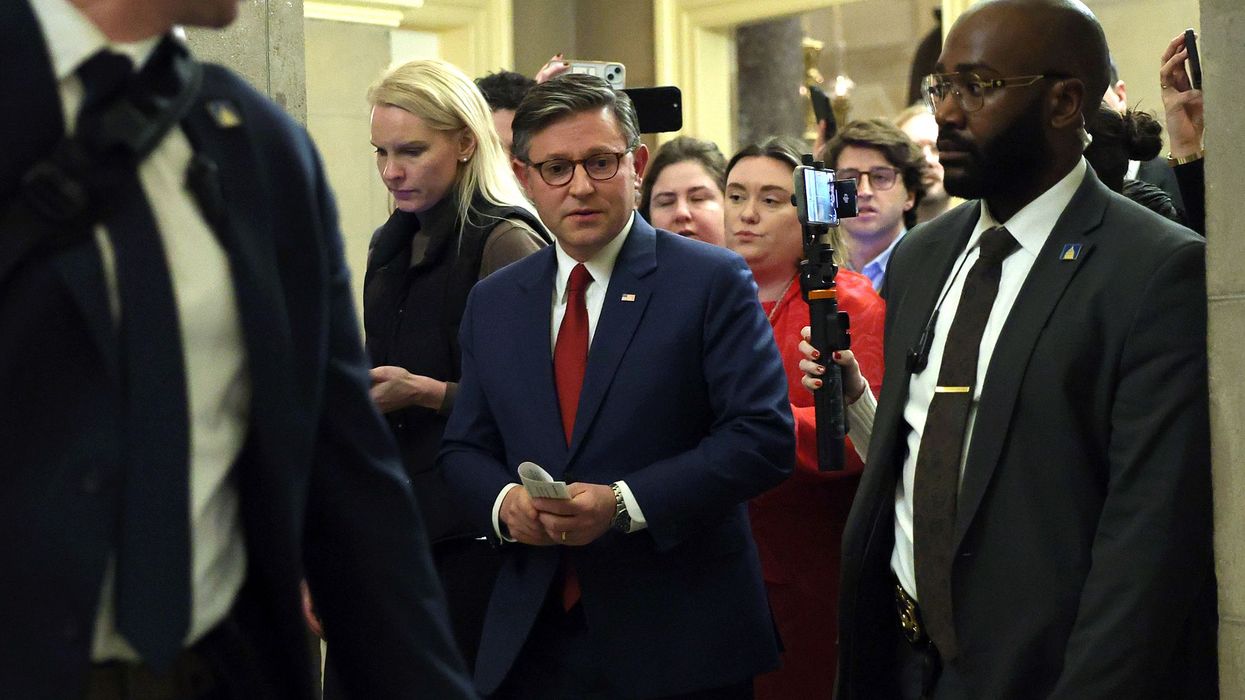February, 17 2022, 09:39am EDT

New Study Finds Big Oil Climate Pledges are More Lies and Greenwashing
Board members from Exxon, Chevron, Shell, and BP are expected to face questions from U.S. House Oversight Committee on March 8
WASHINGTON
Oil giants ExxonMobil, Chevron, BP, and Shell are talking more about clean energy commitments, but their pledges aren't backed up by "concrete actions," according to a major peer-reviewed study published in the journal PLOS One, which found the oil majors have not significantly moved away from their fossil fuel products driving the climate crisis.
"We thus conclude that the [companies'] transition to clean energy business models is not occurring, since the magnitude of investments and actions does not match discourse," wrote the researchers from Tohoku University and Kyoto University in Japan. "Until actions and investment behavior are brought into alignment with discourse, accusations of greenwashing appear well-founded."
Board members from the four oil majors are being asked to testify before Congress on March 8 as part of the House Oversight and Reform Committee's widening investigation into "the fossil fuel industry's long-running campaign to spread disinformation about climate change and greenwash its role in causing global warming." The board members previously declined a request to testify about their companies' climate pledges earlier this month.
The companies are also facing a growing number of U.S. lawsuits for lying about their products' role in causing climate change.
In response, Richard Wiles, president of the Center for Climate Integrity, released the following statement:
"This study confirms what observers have always known about Big Oil's climate pledges: they're all hot air. Oil and gas companies talk like they care about the climate, but they keep drilling and polluting with complete disregard for the damage they cause.
"The oil and gas industry's deception has now landed these companies in front of Congress and in courtrooms across the country. Polluters cannot and should not be trusted to help solve the very climate crisis they knowingly caused."
Background on congressional investigation into Big Oil's climate disinformation efforts:
The U.S. House Committee on Oversight and Reform has held two hearings in the last five months as part of its ongoing investigation into the fossil fuel industry's role in spreading climate disinformation, with the third planned for March 8.
In an October 2021 hearing, the leading executives of the four oil and gas companies refused to commit under oath, during questioning from Chair Carolyn Maloney and others, that their companies would stop spending money to oppose efforts to reduce emissions and combat climate change.
During the second hearing, on February 8, climate scientists and experts testified that the four companies are driving the climate crisis through their continued pollution, insufficient corporate pledges, and spreading of climate disinformation.
Background on lawsuits seeking to hold Big Oil accountable for deceiving the public about climate change:
Since 2017, the attorneys general of Connecticut, Delaware, Massachusetts, Minnesota, Rhode Island, Vermont, and the District of Columbia, as well as 20 city and county governments in California, Colorado, Hawaii, Maryland, New Jersey, New York, South Carolina, and Washington, have filed lawsuits to hold major oil and gas companies accountable for deceiving the public about their products' role in climate change.
The Center for Climate Integrity (CCI) helps cities and states across the country hold corporate polluters accountable for the massive impacts of climate change.
(919) 307-6637LATEST NEWS
'Straight-Up Nazi Stuff': Trump Admin Plans to Strip More Naturalized Americans of Citizenship
"Requiring monthly quotas that are 10 times higher than the total annual number of denaturalizations in recent years," said one former immigration official, "turns a serious and rare tool into a blunt instrument and fuels unnecessary fear and uncertainty."
Dec 18, 2025
Policy experts were skeptical Wednesday that the Trump administration could legally or practically carry out its threat to strip more naturalized Americans of their citizenship. Still, they warned that new guidance issued by the White House to immigration officials would ramp up "fear and terror" in immigrant communities and could portend the targeting of naturalized citizens who President Donald Trump views as adversaries.
The guidance was issued Tuesday to US Citizenship and Immigration Services (USCIS) field offices, with officers directed to supply the Department of Justice (DOJ) with "100-200 denaturalization cases per month” in the 2026 fiscal year.
The denaturalization process is "deliberately hard" for the federal government, noted American Immigration Council senior fellow Aaron Reichlin-Melnick, and stripping people of the citizenship is a rare step only taken in cases of fraud when they applied to be a citizen or in other narrow circumstances.
As such, between 2017-25, there have been just over 120 denaturalization cases filed with the Office of Immigration Litigation at the DOJ.
Under the first Trump administration, denaturalization cases peaked at 90 in one year in 2018, and the directive issued Tuesday signaled the White House is aiming for a far bigger escalation as it also continues its mass deportation operation and blocks people from seeking asylum as they are permitted to under international law.
Reichlin-Melnick called the directive for a denaturalization quota "vicious and cruel," and pointed out that the president is asking USCIS and the DOJ to take on an onerous task.
"These cases are hard to file and win, and require a lot of DOJ resources, and the DOJ is stretched thin already. So we’ll see; I have serious doubts about their ability to do this," said Reichlin-Melnick.
USCIS refers cases to the DOJ, which must prove in a federal court that it has "unequivocal evidence" that someone obtained their citizenship illegally or fraudulently.
"The Supreme Court has repeatedly stated that citizenship and naturalization are too precious and fundamental to our democracy for the government to take it away on their whim. Instead of wasting resources digging through Americans’ files, USCIS should do its job of processing applications, as Congress mandated,” Amanda Baran, a former senior USCIS official who served during the Biden administration, told the New York Times.
Naturalized Americans account for 26 million people in the US, with 800,000 people sworn in last year. In most cases, a person who loses their citizenship status is classified as a legal permanent resident.
Trump has repeatedly called to denaturalize Rep. Ilhan Omar (D-Minn.) and to deport her over her criticism of his policies, and has made the same threat against New York Mayor-elect Zohran Mamdani, a democratic socialist.
In those threatened cases, wrote Michael Waldman, president and CEO of the Brennan Center for Justice, earlier this month, "it appears that crime isn’t so much a motivation as disloyalty."
"Stripping citizens of their citizenship in the name of making the electorate more 'American' is arguably one of the most un-American acts imaginable," wrote Waldman. "We are a nation of immigrants and also a nation of laws. The courts must continue to ensure that those laws protect naturalized citizens from being punished for speaking out."
Three other Brennan Center experts also recently wrote about the history of denaturalization efforts in the US, including during the "Red Scare" of the 1950s:
Sen. Joseph McCarthy of Wisconsin led witch hunts, with denaturalization often used as a tool against accused communists or sympathizers. Among those targets was Harry Bridges, an Australian-born, nationally known labor leader accused of being a communist, who faced an ultimately unsuccessful campaign to revoke his citizenship. The Supreme Court ruled in his favor, not once, but twice.
"This is straight-up Nazi stuff and I’m calling on my fellow Jewish Americans who know where this can lead to be in the vanguard against it," said Dylan Willams, vice president for government affairs at the Center for International Policy, also noting that the influential American Israel Public Affairs Committee has endorsed Rep. Randy Fine (R-Fla.), who has called for the denaturalization and expulsion of Muslim Americans and immigrants.
Sarah Pierce, a former USCIS official, told the Times that Trump's quota for denaturalization cases "risks politicizing citizenship revocation" as it has been in the past.
“And requiring monthly quotas that are 10 times higher than the total annual number of denaturalizations in recent years," she said, "turns a serious and rare tool into a blunt instrument and fuels unnecessary fear and uncertainty for the millions of naturalized Americans.”
Keep ReadingShow Less
House GOP to Skip Town Early for Holiday Recess as Healthcare Premiums Soar, Epstein Files Loom
"The same GOP that voted last summer to give the richest Americans and most profitable companies trillions of dollars in tax cuts somehow can't find the funds this winter to ensure 20 million Americans can afford their health insurance."
Dec 18, 2025
The US House was originally scheduled to be in session on Friday, but the Republican leadership gave members a green light to skip town on Thursday for the two-week holiday recess without voting to prevent massive health insurance premium hikes for tens of millions of Americans.
The decision to let members leave early came after House Democrats secured enough support from swing-district Republicans to force a vote on legislation that would extend Affordable Care Act (ACA) subsidies that are set to expire on December 31, sending premiums soaring.
Democrats on Wednesday demanded an immediate vote on the proposed three-year extension of the ACA tax credits, but Republicans instead pushed to the floor and passed their own healthcare bill that would leave around 100,000 more Americans uninsured per year over the next decade—on top of the millions set to lose coverage due to the expiration of the enhanced subsidies.
The GOP bill is doomed to fail in the narrowly Republican-controlled Senate, which voted down a Democratic push for an extension of the subsidies earlier this month.
More than 20 million Americans relied on the tax credits to afford health insurance. With their expiration, ACA marketplace premiums are set to more than double on average, pricing many people out of coverage entirely.
"Congressional Republicans could have followed through on their promises to help families afford the basics by extending the premium tax credit enhancements to help them enroll in affordable, comprehensive coverage. Instead, they recycled old ideas, refused to address the current affordability crisis—and made plans to go home," Sharon Parrott, president of the Center on Budget and Policy Priorities, said in a statement Wednesday.
"On the brink of this deadline, some Republicans have recognized that the stakes for families are too high to do nothing," Parrott added, pointing to the four GOP lawmakers who signed the discharge petition. "A House bill to extend the premium tax credit enhancements now has the required signatures on its discharge petition to force a vote on the House floor. Republican policymakers should step up and put the needs of individuals and families first."
"If Speaker Johnson refuses to bring forth the vote, he’s telling the American people loud and clear that rising healthcare costs are acceptable to him."
It's unclear when the discharged House Democratic bill will get a vote, as the chamber is not scheduled to return until January 6, 2026—after the ACA tax credits expire.
"If Speaker Johnson refuses to bring forth the vote, he’s telling the American people loud and clear that rising healthcare costs are acceptable to him," said Rep. Jasmine Crockett (D-Texas), who is running to unseat Sen. John Cornyn (R-Texas) in next year's midterm election.
David Kass, executive director of Americans for Tax Fairness, said in a statement Thursday that "instead of siding with millions of everyday Americans, they voted to increase healthcare costs which will now put affordable coverage out of reach for millions."
"Congressional Republicans once again revealed whose side they're on," said Kass. "The same GOP that voted last summer to give the richest Americans and most profitable companies trillions of dollars in tax cuts somehow can't find the funds this winter to ensure 20 million Americans can afford their health insurance."
The House Republican leadership's decision to start the holiday recess also came ahead of the Friday deadline for the Trump administration to release most of the Epstein files, as required by recently enacted legislation.
"View all political developments for the rest of the week in light of the fact that the Epstein files are supposed to be released on Friday," said Rep. Alexandria Ocasio-Cortez (D-NY). "House Republicans just suddenly cancelled congressional session Friday and are sending everyone home Thursday evening."
Keep ReadingShow Less
63% of US Voters Oppose Attack on Venezuela as Trump's March to War Accelerates
The new poll comes as the US president openly plots to seize Venezuela’s oil supply.
Dec 18, 2025
President Donald Trump has taken increasingly aggressive actions against Venezuela in recent weeks, but a new poll released Wednesday shows US voters are not on board with a new war.
A new poll from Quinnipiac University found that 63% of voters oppose military operations inside Venezuela, with just 25% registering support.
What's more, a US military strike in Venezuela would draw significant opposition even from Republican voters, 33% of whom told Quinnipiac that they would oppose such an action. Eighty-nine percent of Democratic voters and 68% of independent voters said they were opposed to a US military campaign in Venezuela.
Trump's policy of bombing suspected drug trafficking boats in international waters, which many legal experts consider to be acts of murder, drew significantly less opposition in the new survey than a prospective attack on Venezuela, but it is still unpopular, with 42% in favor and 53% opposed.
A potential war is also unpopular with Venezuelans, as a recent survey from Caracas-based pollster Datanalisis found 55% opposed to a foreign military attack on their nation, with 23% in favor.
The Trump administration's boat strikes, which have now killed at least 99 people, have been just one aspect of its campaign of military aggression against Venezuela. The US military last week seized a Venezuelan oil tanker, and Trump has said that it's only a matter of time before the military launches strikes against targets inside the country.
Trump on Wednesday also said that one goal of his campaign against Venezuela would be to seize the country's oil supply.
“Getting land, oil rights, whatever we had—they took it away because we had a president that maybe wasn’t watching,” Trump said while talking to reporters. “But they’re not gonna do that. We want it back. They took our oil rights. We had a lot of oil there. They threw our companies out. And we want it back."
Venezuela first nationalized its oil industry in 1976, and the US has no legitimate claim to the nation's petroleum supply.
Keep ReadingShow Less
Most Popular


